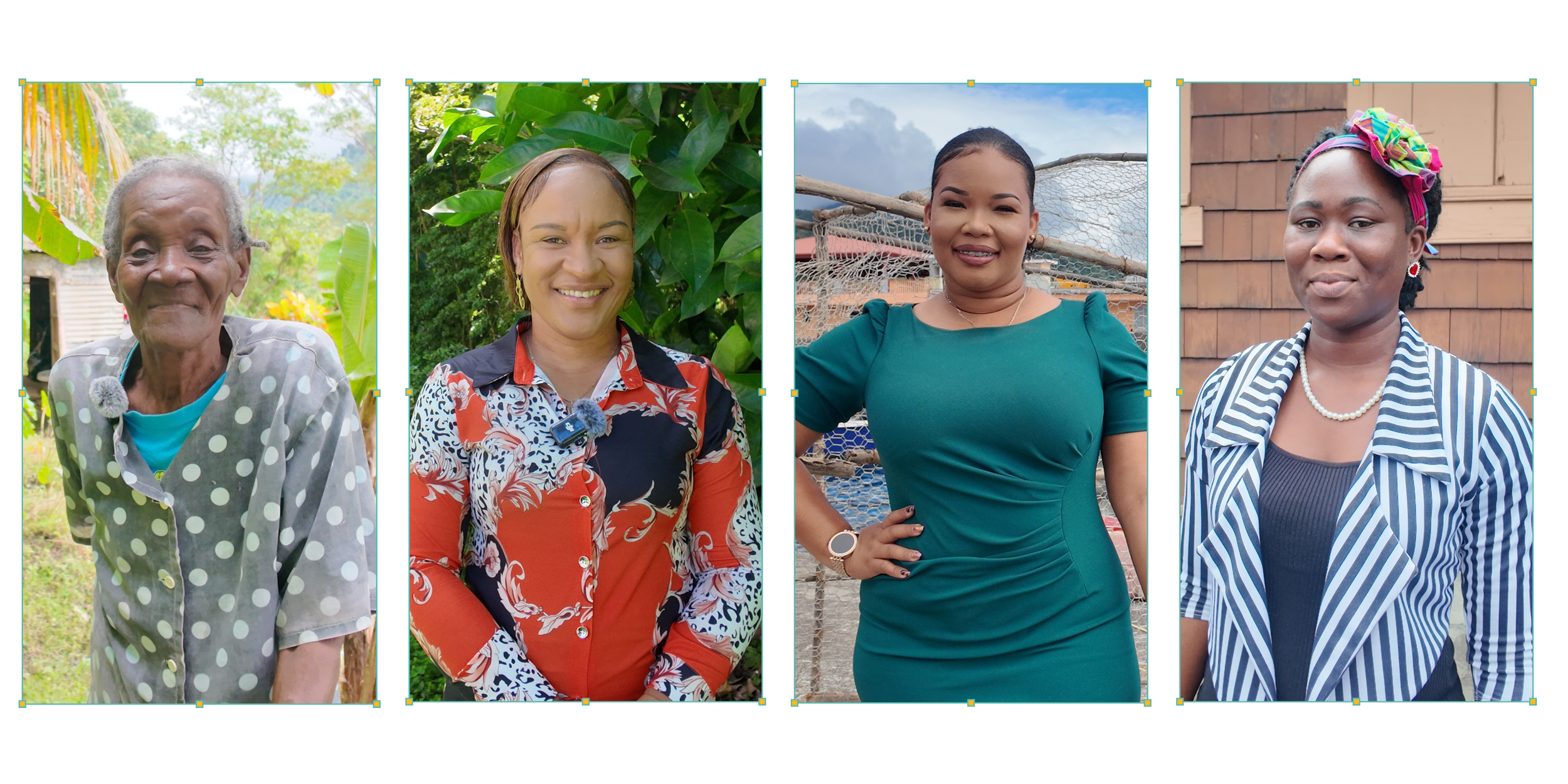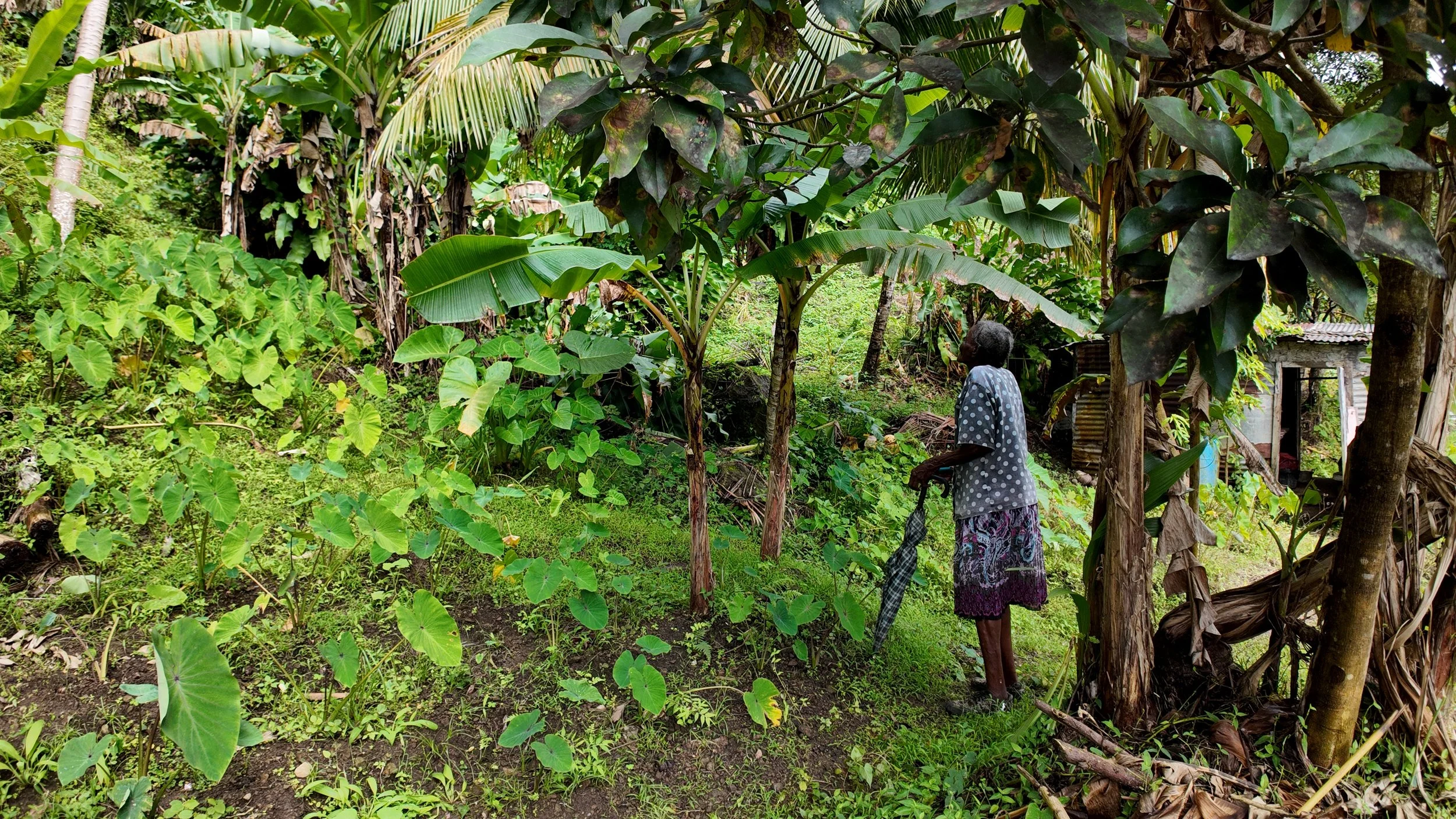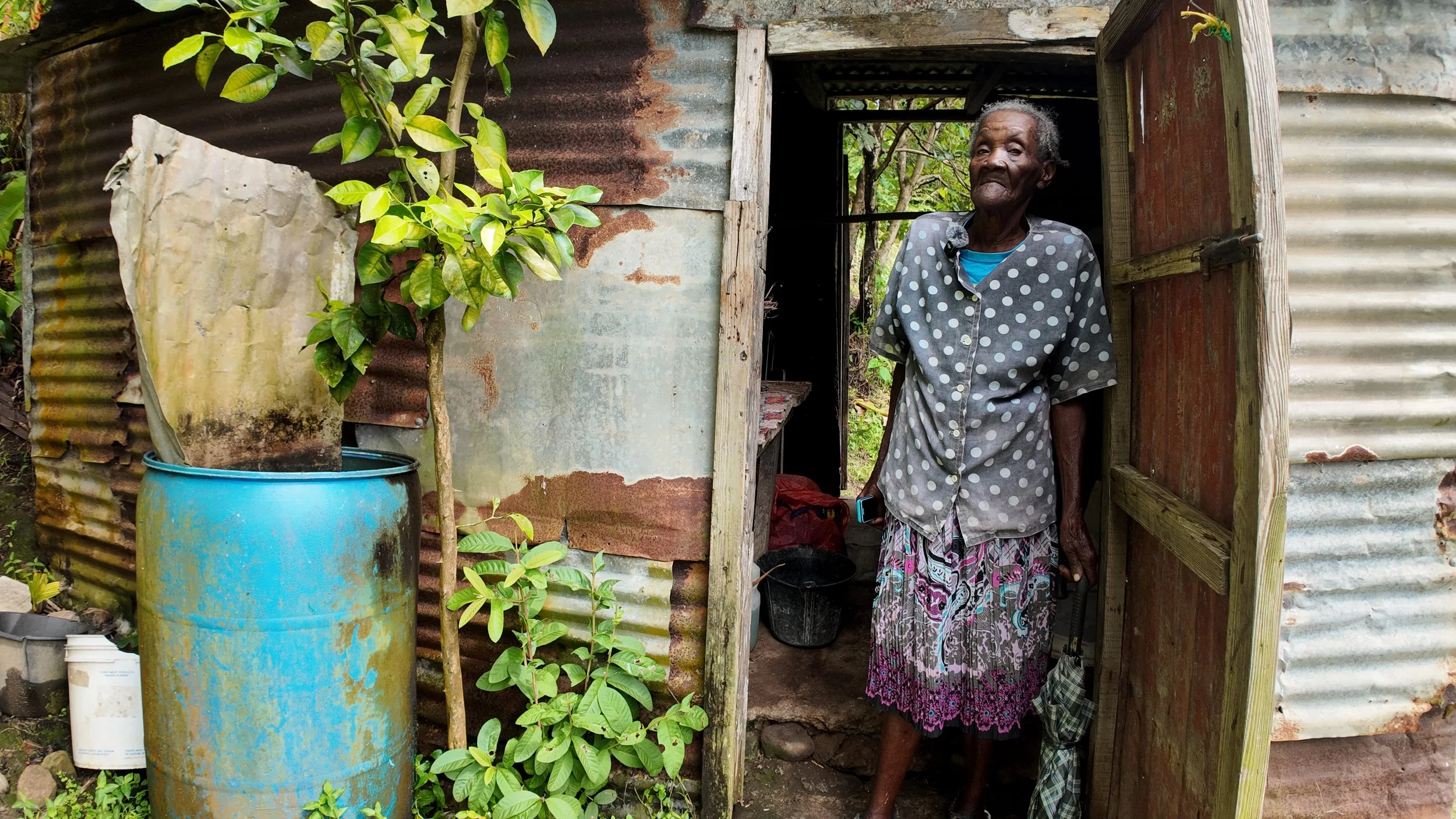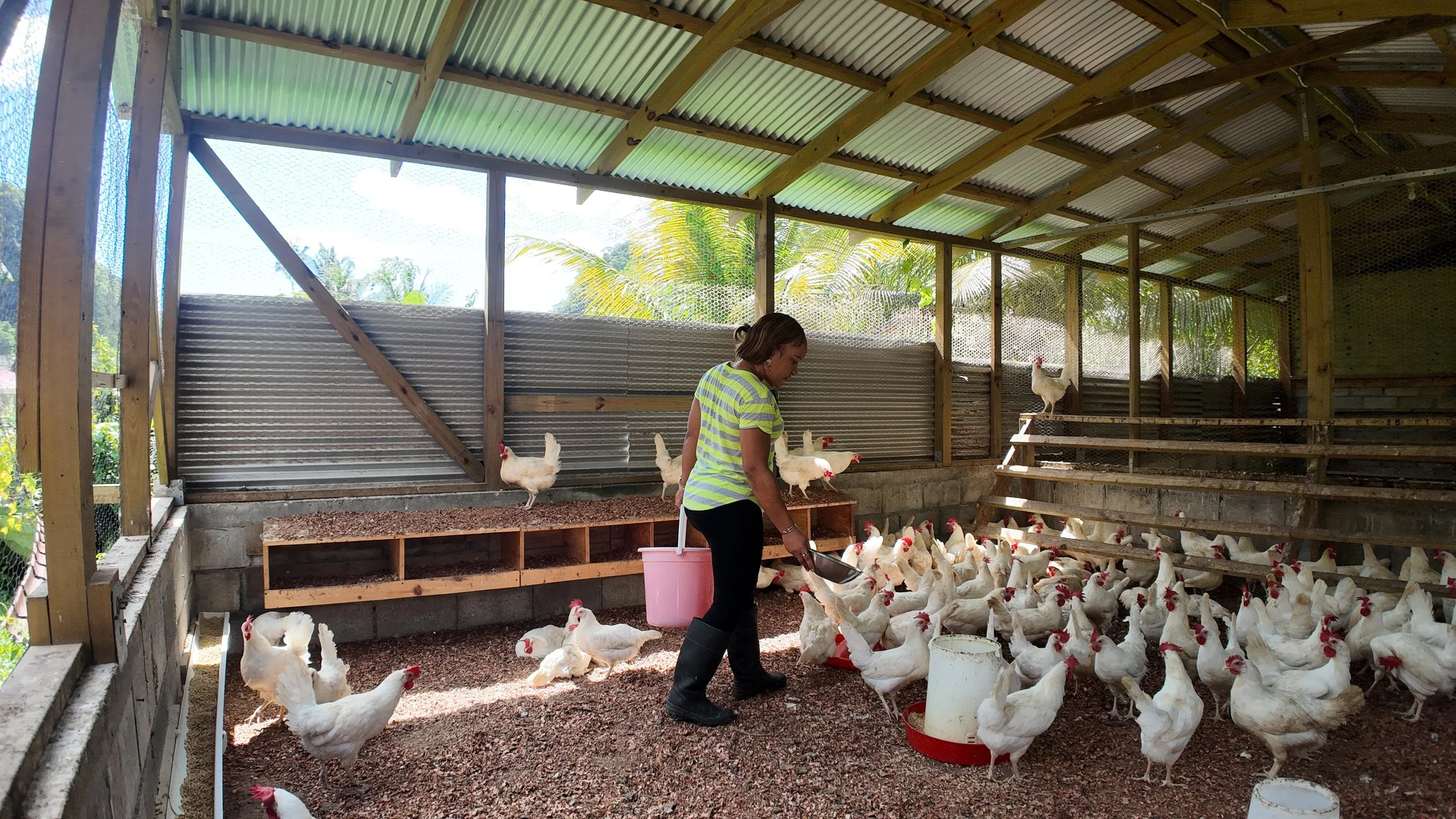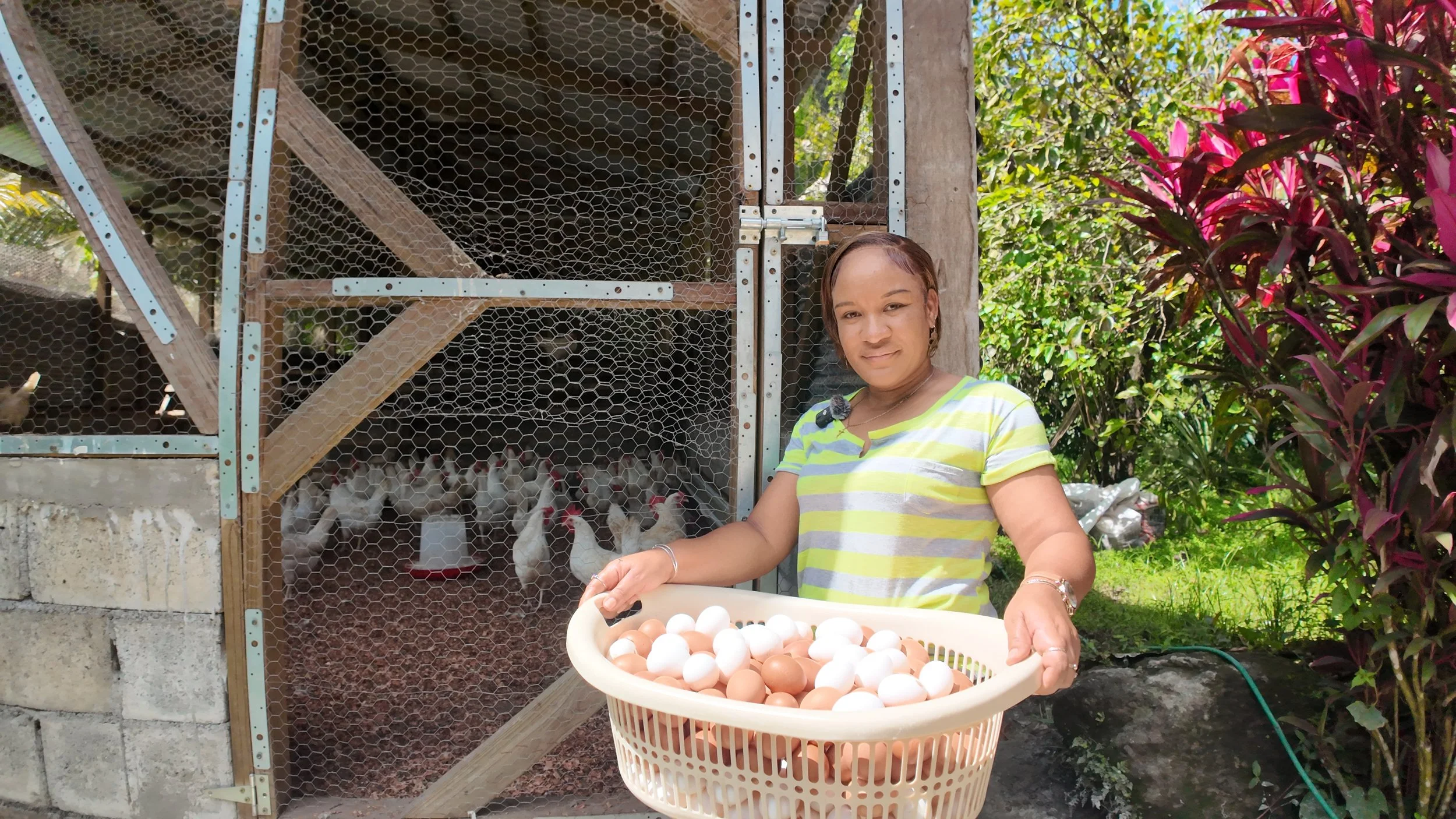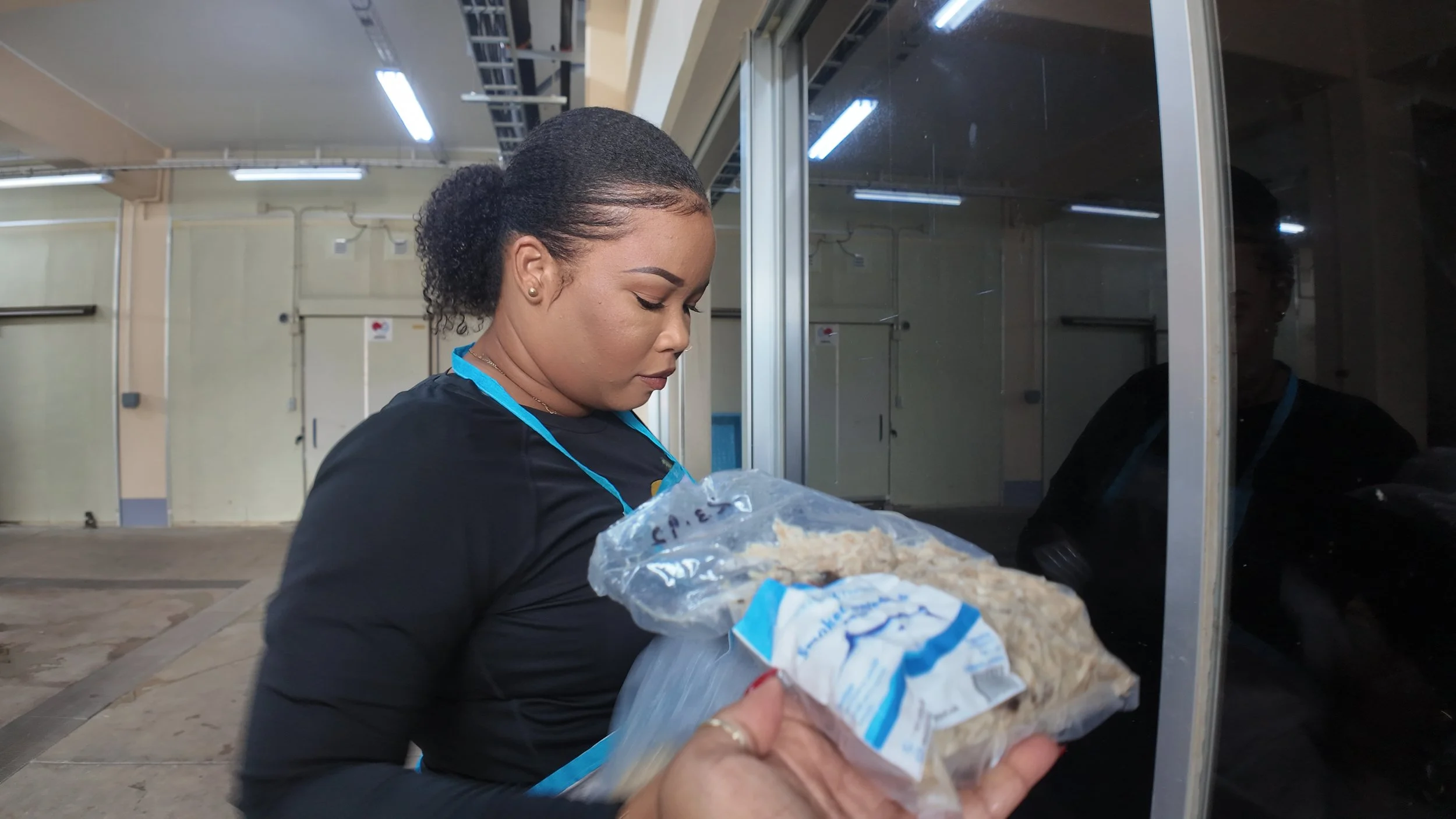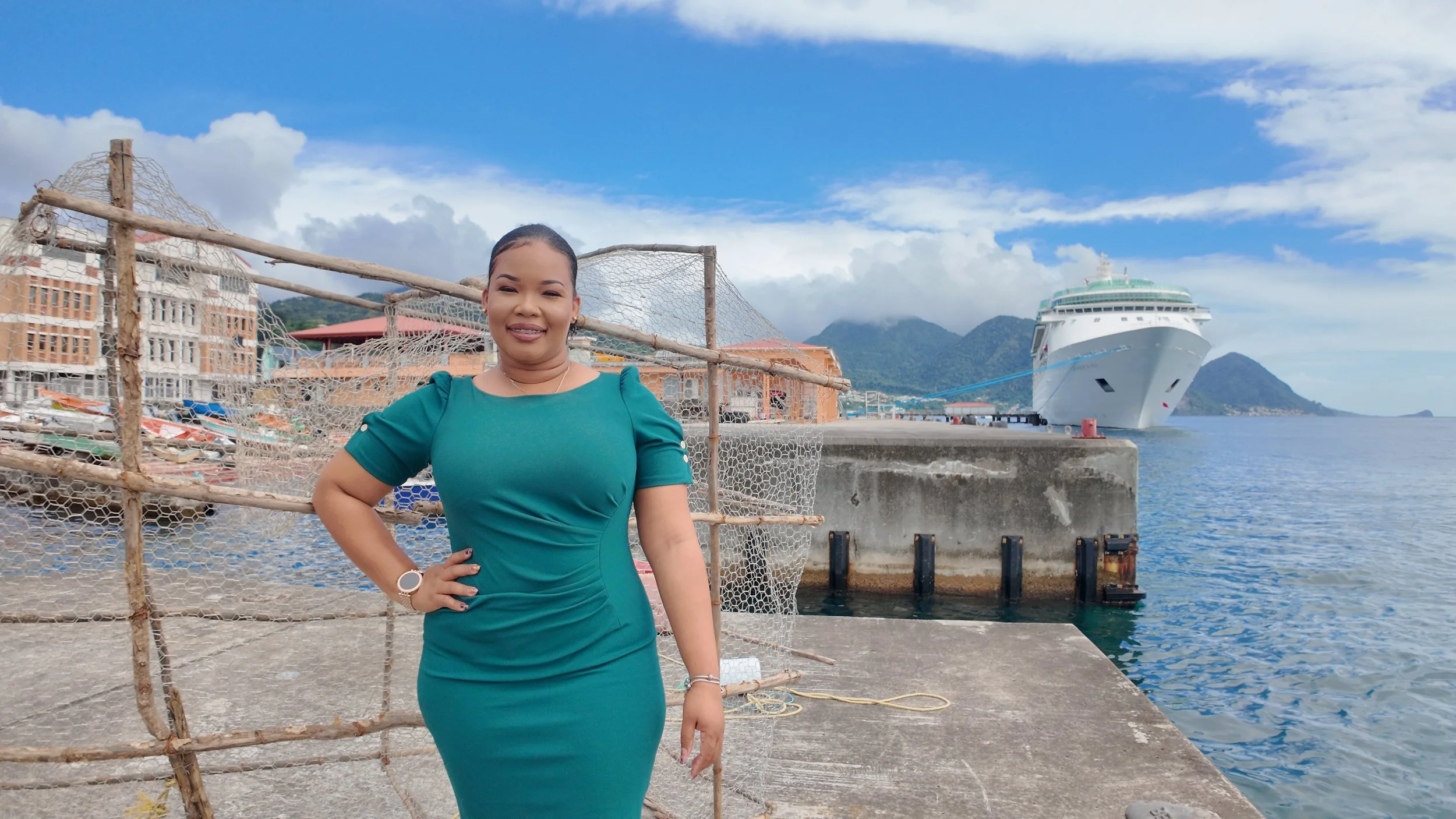Women and the Changing Face of Agriculture in Dominica
Pauline John-Denis, Charlene Xavier, Zethra Baron, Callister Sango (L-R)
International Organization for Migration - Dominica
Pauline John: A Woman’s Legacy in Farming
As International Women's Day approaches, we celebrate the resilience and dedication of women in agriculture. One such woman is Pauline John-Denis, a seasoned farmer, from the community of Grand Bay, who has dedicated her life to working the land. Her story reflects both the challenges and triumphs of women in farming, shedding light on the evolution of agriculture and the vital role women continue to play in it.
Pauline John-Denis has been farming since she was young, learning the trade from her father. “ I was going to school, but my father taught me,” she recalls. Farming was never just a job for her —it was a passion. “Did you always want to be a farmer?” she was asked. Without hesitation, she replied, “Always, always. I love farming. I don’t know why, but I love farming.”
Pauline John-Denis
“Always, always. I love farming. I don’t know why, but I love farming.”
For John-Denis , farming is not just about making a profit but about feeding her family and ensuring sustainability. “My message to women: they must farm for their family,” she asserts. She believes that farming is an essential practice for self-sufficiency and survival. “For you to grow, you grow to eat or for money,” she says, emphasizing the dual role of agriculture in sustenance and economic empowerment.
John-Denis takes immense pride in her crops, especially potatoes, dasheen, and plantains. “I love potatoes. I can boil potatoes with some milk. I put in milk with it, while crushing it, and then I can eat,” she shares with enthusiasm. Her connection to the land is evident in her commitment to growing nutritious food and maintaining agricultural traditions.
Like many women in agriculture, John-Denis has faced significant challenges, including physical demands, economic hardships, and recovery from natural disasters. One of the biggest obstacles she encountered was rebuilding after a hurricane. “After the hurricane [Hurricane Maria 2017], it was dangerous because trees would fall. I had to pay somebody to clean up for me, clean them properly,” she recalls.
Her resilience is evident in how she overcame these setbacks. Despite an injury to her knee, she continues to work the land. “I knocked it on my step to go downstairs. I went to the hospital, they gave me something to hold it up, and I keep working,” she says.
“You must farm for your family.”
Pauline John-Denis
Agriculture has transformed significantly over the years, and John-Denis has witnessed these changes firsthand. She observes that fewer young people are interested in the trade. “Some people don’t want to work. They don’t want to make farming. They rather stay on the road” she says, lamenting the decline of farming among younger generations.
She believes that younger individuals should appreciate the value of farming, not just for economic gain but for self-reliance. “When your mother and your father are gone, what they showed you, you should have it in mind to do it,” she advises. Her words serve as a call to action for young people to embrace agriculture as a means of sustaining themselves and their communities.
John-Denis has a powerful message for women: “You must farm for your family.” She believes that women should take pride in cultivating the land.
Pauline John-Denis’s call for women to embrace farming extends beyond traditional crops. Women across various sectors of agriculture are proving their resilience and innovation. One such woman is Charlene Xavier, a poultry farmer who has turned a small venture into a thriving business.
Charlene Xavier “Poultry Farmer”
As a poultry farmer and the owner of Allen’s Poultry in the Roseau Valley, her journey, which began with just 40 layers as a small venture, has now expanded to 300 birds, with aspirations for even greater growth. She took over the business from her stepfather who asked her to keep the name, his legacy.
Xavier’s day begins before the sun rises. At 6:15 AM, she visits her farm, ensuring that the lights, which are left on at night to aid production, are in place.
Charlene Xavier
When I wake up, I visit the farm about 6:15am then I put up the lights, because I leave lights on at nights for them.
“When I wake up, I visit the farm about 6:15am then I put up the lights, because I leave lights on at nights for them. This helps with their production. I check around the farm. I have two cages, white layers and brown layers. I feed them, give them water, whatever they need.”
Collecting eggs is another crucial part of her routine, ensuring that production remains steady. By midday, she repeats the process to maintain the well-being of her flock. As dusk approaches, she returns to the farm to turn the lights back on and prepare for the next cycle. With the support of a small but efficient team, she maintains a clean and organized farm, ensuring the highest standards of egg production.
Like many farmers, Xavier faces significant challenges in her work. One of the most persistent issues is her chickens pecking at their own eggs, which leads to loss of productivity. To counter this, she ensures that egg boxes are well-cushioned with shavings, minimizing the chances of eggs cracking and deterring the birds from pecking at them. Another major concern for Xavier and other poultry farmers is the potential threat of avian influenza, which has been affecting poultry farms in the United States.
Financial challenges also remain a hurdle, as scaling up production requires significant investment. Despite these challenges, Xavier continues to push forward, proving that with resilience and strategic problem-solving, women in agriculture can overcome barriers and thrive.
Xavier is committed to sustainability and efficiency in her farm operations. She uses energy-saving lighting at night to enhance productivity while reducing electricity costs. To optimize feeding, she utilizes guttering systems, ensuring that food and water are evenly distributed. Additionally, she engages in waste recycling by selling poultry manure to other farmers, promoting a circular economy within the agricultural sector.
Zethra Baron “Breaking Barriers in the Blue Economy”
In the ever-evolving landscape of the blue economy, one name stands out in Dominica: Zethra Baron. A fisheries liaison officer with the Ministry of Agriculture, Blue, and Green Economy, and the visionary entrepreneur behind Seafood Mistress, Baron is making waves in a traditionally male-dominated subsector.
For women venturing into ocean-based industries, Baron’s message is clear—keep pushing, keep breaking barriers, and, most importantly, build alliances with other women.
Zethra Baron
“I registered Seafood Mistress in 2020 and launched operations in 2022. It wasn’t a walk in the park.”
“To my fellow sisters in ocean-based industries, my advice to you is to keep pushing. Keep breaking those areas. Keep partnering with sisters, both nationally, internationally, and regionally. They are the ones who can be your mentors, the best ones at that,” she shared.
Despite the challenges women face in these industries—financial constraints, gender biases, and operational hurdles—Baron’s journey proves that success is possible with determination, mentorship, and support systems.
“I registered Seafood Mistress in 2020 and launched operations in 2022. It wasn’t a walk in the park,” she admitted. “You have all those challenges, but I’m here to tell you that you can. If you stick to your goal, have discipline, and maintain your vision, you will succeed.”
As a fisheries liaison officer, Baron understands the complexities of policy and regulation in the blue economy. She stresses the importance of community engagement, particularly in coastal areas, to ensure sustainability efforts are both understood and adhered to. “Policy and regulation can only work effectively if everyone is considered, especially persons within coastal communities. Communication is key—if people don’t know what the policies are, how can they abide by them?”
Beyond her governmental role, Baron integrates sustainability into her business model. Seafood Mistress prioritizes sourcing from fishers who use sustainable practices and aims to transition to eco-friendly packaging and renewable energy solutions.
“The goal is to have full eco-friendly packaging and operate on solar electricity. Economic growth and environmental sustainability must go hand in hand,” she affirmed.
A key takeaway from Baron’s journey is the necessity for women to uplift and support each other. “I want to commend sisters like myself who continue to work in male-dominated sectors, encourage them to keep fighting, and to be a support and strength to other sisters like me and those to come.”
Her advocacy extends beyond business and policy; she actively engages with schools, educating young students on marine conservation and sustainable fishing practices. Through these initiatives, she hopes to inspire the next generation of women in the blue economy.
Just as Baron is committed to empowering the next generation in the blue economy, Callister Sango is reshaping the agricultural sector through networking and innovation. Through her company, Agrivertise, Sango has created a platform that bridges the gap between farmers and buyers, ensuring that local producers—especially women—have greater access to markets and opportunities.
Callister Sango: “Empowering Women in Agriculture Through Agrivertise”
Growing up in the farming community of Penville, Callister Sango was exposed to agriculture from an early age. Farming was not just an occupation for the people in her village—it was a way of life. When she attended college and explored her career options, she gravitated toward agriculture, seeing it as a field with vast opportunities beyond traditional roles.
"I did not want to settle for just administrative work. I felt like I was more than that, and agriculture challenged me in ways that excited me," Sango explains.
During her studies, she discovered a strong interest in the sales and marketing aspect of agriculture. This passion led to her field research project, where she investigated the challenges that farmers faced in accessing markets. What she found was a gap in the system—farmers struggled to connect with buyers, often missing out on potential revenue. Seeing an opportunity to solve this issue, Sango launched Agrivertise, an online agricultural marketplace dedicated to making these connections seamless.
Agrivertise provides a platform where farmers can list their available products, and buyers can easily find and purchase what they need.
"Our women farmers are very busy. Many of them juggle multiple responsibilities, including managing their homes and sometimes working additional jobs. Agrivertise makes it easier for them to sell their produce without having to spend extra time searching for buyers," Sango says.
Through the platform, buyers can see what products available and place orders, allowing farmers to focus on their core work—growing and harvesting crops. The convenience Agrivertise offers is particularly beneficial for women, who often bear the burden of unpaid labor alongside their farming duties.
One of the biggest challenges in the agricultural sector is the integration of technology. While digital platforms can enhance efficiency, many farmers are unfamiliar with online tools or do not have time to engage with complex systems. Sango recognized this and took a simplified approach.
"The key is to make things easy for the farmers, not for us. If they find it easier to take a phone call rather than sign up for an app, then we accommodate that. We meet them where they are," she explains.
By adopting a user-friendly approach, Agrivertise ensures that even the busiest farmers can benefit from its services. The company also prioritizes the sale of value-added products like castor oil and coconut oil, which are less perishable than fresh produce, reducing the pressure on farmers to make quick sales.
Like many women entrepreneurs, Sango has faced obstacles, particularly in securing financial and human resources.
"Agriculture is a broad sector, and connecting with farmers who are often in remote areas is challenging. Without proper funding and a dedicated team, it's tough to scale up," she admits.
Despite these challenges, Agrivertise has made a significant impact, particularly during the COVID-19 pandemic. Working with four main farmers’ groups across Dominica, Sango helped farmers use her platform to sell their produce at a time when traditional markets were disrupted.
"It was one of my proudest moments—seeing farmers get calls and orders just from posting their products on my Facebook page. My own mother, who is a vendor, used the platform to source produce from women farmers," she shares.
Women play a crucial role in food production, yet they often face barriers to land ownership, financing, and market access.
“Agriculture is the foundation of everything—our food, clothing, and shelter. We cannot afford to overlook the contributions of women in this sector. They need better access to resources and platforms that simplify their work and boost their earnings”
"Agriculture is the foundation of everything—our food, clothing, and shelter. We cannot afford to overlook the contributions of women in this sector. They need better access to resources and platforms that simplify their work and boost their earnings," she emphasizes.
Sango’s message to women in agriculture is one of perseverance and innovation: "Do not give up on this sector. Modernize your approach and find ways to make agriculture work for today’s economy. Stay focused, and don’t be afraid to explore technology to make your business more efficient."
Through Agrivertise, Sango is not just building a business—she is fostering a movement that empowers women, strengthens communities, and ensures that agriculture remains a sustainable and rewarding field for generations to come.
Make it stand out
www.blackislandgirl.com/shop

